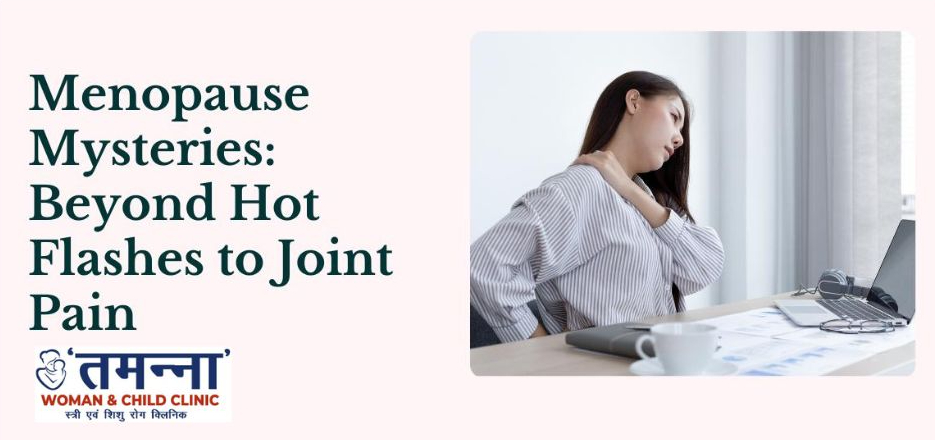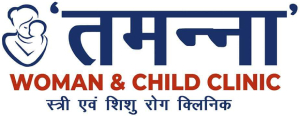Understanding Menopause: A Natural Change in Women's Lives By Best Gynecologist in Raipur

What is Menopause?
What Causes Menopause?
Reasons for Menopause
Natural Aging
As women grow older, their ovaries, which are part of their reproductive system, make fewer hormones. These hormones help control periods and other parts of a woman's health. When the ovaries make less hormones, it leads to menopause.
Genetics
Family history and genetics also play a role in when women go through menopause. Women often have menopause at around the same age as their mothers and sisters. It can be familial.
Hysterectomy
Sometimes, ladies have surgery called a hysterectomy to expel their uterus (womb). If their ovaries are also removed during this surgery, it can cause menopause to start earlier.
Chemotherapy and Radiation
Phases of Menopause
Irregular Periods
During perimenopause, a woman’s periods become irregular. This means they may not come every month like they used to. It happens because the hormones in the body are changing.
Symptoms
Women may experience different symptoms during perimenopause because of these hormone changes. Some common symptoms
include:
Hot Flashes: Suddenly feeling very warm all over the body.
Night Sweats: Waking up in the middle of the night feeling sweaty and hot.
Mood Swings: Feeling different emotions more strongly than usual.
Vaginal Dryness: Feeling dry or uncomfortable in the vagina.
Fertility Decline
Even though it’s still possible for women to get pregnant during perimenopause, it becomes harder. This is because the hormone levels that help release eggs are changing. Consulting the Best Gynecologist in Raipur can help manage such changes, along with expert Menopause Treatment in Raipur.
- Menopause
Menopause happens when a woman hasn’t had her period for 12 months in a row. During this time:
Changes in the Ovaries
The ovaries stop releasing eggs, and the body makes less estrogen and progesterone hormones. These changes are natural as women get older.
Symptoms
Women may experience symptoms like feeling suddenly hot (hot flashes), mood swings where emotions change quickly, and feeling dry in the vagina. These side effects happen because of the changes in hormones.
Health Care
Tammana Vinaik Agrawal, an Obstetrician & Gynaecologist doctor in Raipur who helps women, takes care of women during menopause. She helps manage symptoms and makes sure women stay healthy even with lower hormone levels. Her expertise as the Best Gynecologist in Raipur ensures that women receive
comprehensive Menopause Treatment in Raipur and guidance for long-term well-being.
Postmenopause
Postmenopause follows menopause and refers to the years thereafter:
Changes in Symptoms
Symptoms like hot flashes start to go away during postmenopause. However, there are new health concerns. Women may be at higher risk for bone problems like osteoporosis and heart disease because their estrogen levels are lower.
Taking Care of Health
Dr. Tammana Vinaik Agrawal, a doctor in Raipur who helps women, gives special advice to women in postmenopause. She helps them keep their bones strong, their hearts healthy, and their bodies feeling good with specialized Menopause Treatment in Raipur provided by the Best Gynecologist in Raipur.
Effects of Menopause
Physical Effects
Hot Flashes and Night Sweats:
Sometimes, women suddenly feel very hot and start sweating. This can happen during the day (hot flashes) or at night (night sweats). Their heart might beat faster too.
Changes in Vaginal and Urinary Health:
Women may feel dryness in their vagina, which can make sex uncomfortable. They might also get more urinary tract infections, which can cause discomfort when peeing.
Loss of Bone Strength:
With menopause, women might lose some of the strength in their bones. This can make them more likely to get osteoporosis, which means their bones are weaker and can break more easily.
Heart Health Concerns:
Lower levels of estrogen during menopause can affect the heart. It might increase the chance of having heart problems like heart disease.
Emotional and Psychological Effects
Mood Swings:
Sometimes, women might feel more easily annoyed or worried. This happens because their hormones are changing.
Sleep Problems:
Women might have trouble sleeping well because they wake up feeling sweaty (night sweats) or because of changes in their hormones.
Memory Changes:
Some women notice they have a harder time remembering things. This can vary from person to person.
Managing Menopause
Lifestyle Changes
Healthy Diet: A balanced diet rich in calcium, vitamin D, and phytoestrogens (found in soy products) supports bone health and overall well-being.
Regular Exercise: Physical activity helps manage weight, improve mood, and maintain bone density.
Stress Reduction: Relaxation techniques such as yoga, meditation, or deep breathing can alleviate symptoms.
Medical Treatments
Hormone Replacement Therapy (HRT): Estrogen therapy can relieve hot flashes, vaginal dryness, and prevent bone loss. It may be combined with progesterone in women with a uterus to reduce the risk of uterine cancer.
Non-Hormonal Medications: Antidepressants or medications such as gabapentin can help manage hot flashes and mood swings.
Vaginal Estrogen: Creams, rings, or tablets applied locally can relieve vaginal dryness and discomfort.
Considerations for Health
Regular Health Check-ups: Monitor bone health, heart health, and overall well-being with regular visits to an Obstetrician & Gynaecologist in Raipur.
Screening for Osteoporosis: Bone density scans (DEXA scan) may
be recommended to assess bone health and prevent fractures.
Heart Disease Prevention: Adopting heart-healthy habits such as regular exercise and a balanced diet can reduce the risk of cardiovascular disease. The Best Gynecologist in Raipur provides guidance for preventive care and customized Menopause Treatment in Raipur.
Challenges and Disadvantages
Potential Risks
Breast Cancer Risk:
Using hormones for a long time might slightly increase the chance of getting breast cancer, according to some studies.
Blood Clotting:
Estrogen therapy can make blood clotting more likely, especially in women who already have heart problems.
Endometrial Cancer:
Using estrogen without progesterone in women who still have their uterus might raise the risk of getting endometrial cancer, which affects the lining of the uterus.
Emotional Impact
Adjustment:
It can be difficult to acknowledge that the ability to have babies is
ending, and that the body is changing in modern ways. This can make women feel unsure or sad.
Relationships:
Talking openly with partners about how the body is changing and how feelings might change is important. This facilitates partners in understanding and supporting each other more effectively.
Menopause is a normal life organize that requires understanding and adjustment. With proper education, support from healthcare providers like Dr. Tammana Vinaik Agrawal, Obstetricians & Gynaecologists in Raipur, and lifestyle adjustments, women can manage menopausal symptoms effectively and maintain overall health. Each woman’s experience with menopause is unique. So, Book your appointment or contact us today to get personalized care and support through menopause from the Best Gynecologist in Raipur offering trusted Menopause Treatment in Raipur.
